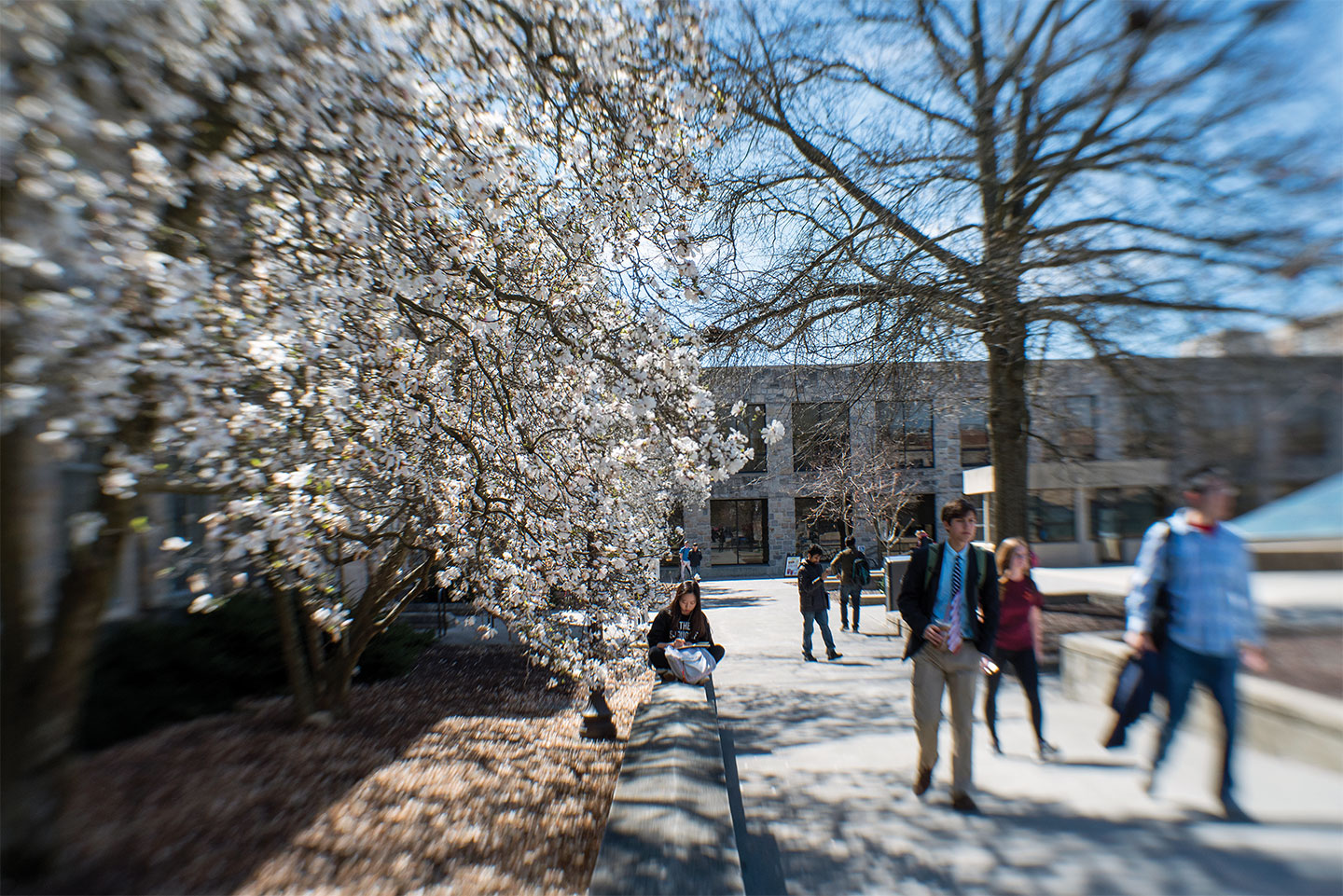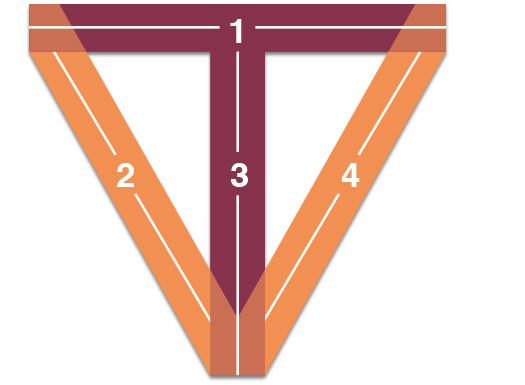The VT-shaped Individual
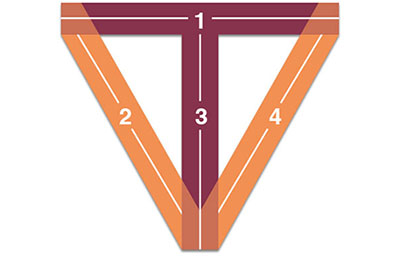
1. Transdisciplinary knowledge and technological literacy
2. Informal communal learning
3. Disciplinary depth
4. Guided experiential learning
To picture Virginia Tech in the year 2047—and to prepare the institution for that future—university leaders are refining one guiding concept and undertaking two initiatives:
The VT-shaped Individual
Beyond Boundaries
Destination Areas
In the following sections, three vice presidents new to Virginia Tech reflect on why they've chosen to make Blacksburg home.
The VT-shaped Individual — In higher education circles, leaders have made much of the so-called T-shaped learner: one whose disciplinary depth is complemented by interdisciplinary know-how. At Virginia Tech, for obvious reasons, we see a VT-shaped individual: one whose "T" is enriched by technological literacy, informal communal learning, and guided experiential learning.
As Provost Thanassis Rikakis has said, gone are the days when a mechanical engineering major graduates and spends an entire career working with 35 other mechanical engineers. Instead, the mechanical engineer will collaborate with others on diverse, interdisciplinary teams, solving complex problems that evolve over time.
Beyond Boundaries — Peering into the future, university leaders have embarked on the Beyond Boundaries visioning process to identify how to best advance as a global land-grant institution, prepare students for the world in which they will live and work, discover new funding models, and envision what Virginia Tech might look like in 2047, the university's 175th anniversary. More→
Destination Areas — In the near term, before the university's sesquicentennial in 2022, Virginia Tech will be deeply involved with proposed Destination Areas—sites of interdisciplinary collaboration where experts are positioned to address the full complexities of broad problems—all while the university maintains comprehensive excellence across Tech's colleges and research institutes. More→
The first five Destination Areas, now under development, are
• Data and Decision Sciences
• Integrated Security
• Intelligent Infrastructure and Human-Centered Communities
• Resilient Earth Systems
• Adaptive Brain and Behavior Across the Life Span
Why here? Why now?
by Thanassis Rikakis
Executive Vice President and Provost Thanassis Rikakis is a tenured professor in the Department of Biomedical Engineering and Mechanics in the College of Engineering and holds a joint appointment as a music professor in the School of Performing Arts in the College of Liberal Arts and Human Sciences. Formerly the vice provost for design, arts, and technology at Carnegie Mellon University, Rikakis earned doctoral and master's degrees from Columbia University and a bachelor's degree from Ithaca College, all in music composition. MORE→
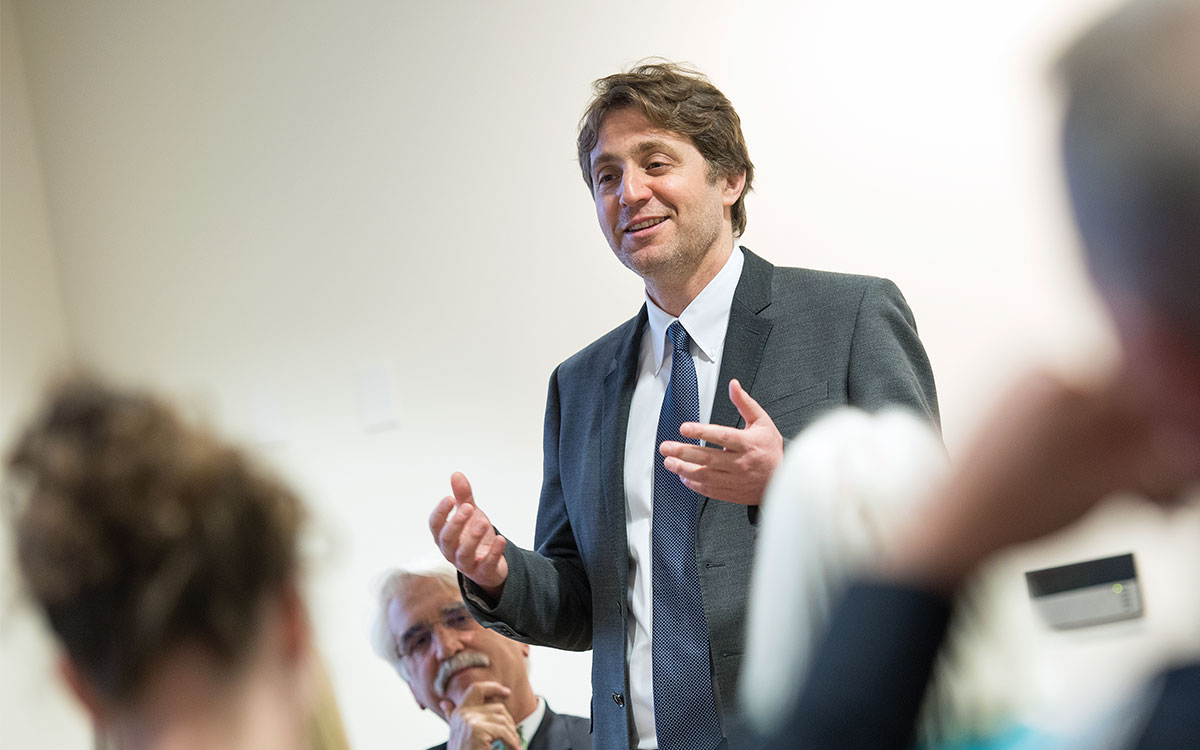
Thanassis Rikakis
In a time of unprecedented disruption, the field of higher education faces a number of challenges—challenges that are also opportunities to rethink how we do business.
First, personalized learning will become the norm. For too long, higher education has held up a narrow definition of excellence. We must move toward an inclusive system of education that allows for different ways of learning. Why? Multidimensional knowledge and achievement feed diverse approaches that are better suited to deal with the diverse complexities of societal problems.
Second, universities are beginning to understand that graduates with disciplinary specialization also must be connected, in an interdisciplinary fashion, to a problem's full range of complexity. Security, for example, isn't just code, but is also interpersonal relationships—and about understanding differences in circumstances and motivations. If we are to produce graduates who can embrace complexity, we must be more inclusive in whom we admit, what knowledge we offer, and how we bring people together.
Third, higher education will become customized. We are moving from a single-peak landscape to a multipeak landscape in which institutions specialize in different educational experiences instead of chasing the same top spots in the rankings.
Another philosophical change is a greater emphasis on lifelong learning. We can't focus only on a student's years on campus. We must enrich the K-16 education pipeline, partnering with local school districts to crate customized pathways toward excellence that assist all Virginia residents. At the same time, we want alumni to partner with us in our teaching and research endeavors, all the while learning from our faculty and students.
Most universities promise to tackle some of the transformative challenges in education at the periphery of their mission, but Virginia Tech has placed them at the core of the contemporary land-grant university—and that's what brought me here. President Sands has a nice way of explaining why Virginia Tech is well positioned: When you look at how this community teaches, investigates, and communicates, the emphasis is on societal impact and service rather than on enriching a specific discipline alone. We understand the importance of disciplines and support them, but we also connect the knowledge arising from disciplines to real-world problems. Virginia Tech has a responsiveness to the world's needs that is unique. Some institutions uphold an artificial, outdated binary that creating knowledge is a higher calling than preparing people to get jobs, when, of course, both can be done.
In addition to societal impact and service, Virginia Tech acknowledges the whole person. When I'm late to a 9 a.m. meeting, Tim [President Sands] makes a point to tell people I had to drop off my daughter, and everybody says, "Awww." That's the experience here—and I love it.
Why here? Why now?
by Menah Pratt-Clarke
Menah Pratt-Clarke is the vice provost for inclusion and diversity and vice president for strategic affairs. Formerly the associate chancellor for strategic affairs and the associate provost for diversity at the University of Illinois at Urbana-Champaign, Pratt-Clarke earned undergraduate and master's degrees from the University of Iowa and master's, doctoral, and law degrees from Vanderbilt University. MORE→
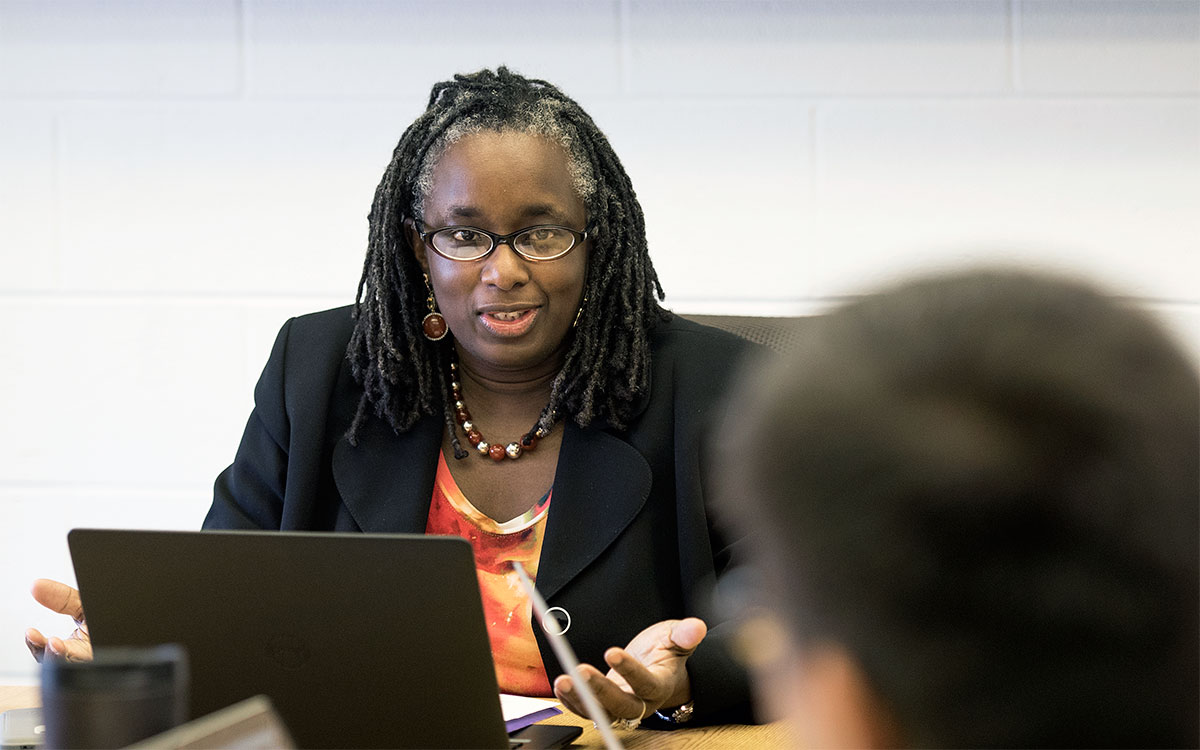
Menah Pratt-Clarke
Two things struck me when I first visited the Blacksburg campus for search committee interviews: the university's motto and the kindness of the community.
As an African-American woman, and someone who is not typically fond of small towns or cold weather, I needed to feel that I could live here. I needed to be able to see myself here. During that visit, I encountered a level of genuine kindness that I had never encountered before, even after living in the South for 20 years.
The Ut Prosim (That I May Serve) motto left an equally powerful impression on me. The power of the motto is a phenomenal foundation for our diversity and inclusion work, as are the university's Principles of Community and the existing efforts to improve inclusion and diversity. These were the factors that drew me to Virginia Tech.
At Virginia Tech, the InclusiveVT framework—in which the responsibility for advancing diversity and inclusion is shared across the university community—is tremendously valuable. And the leadership of President Tim Sands and Provost Thanassis Rikakis gave me the sense that we are well positioned to move forward.
Achieving a sustainable transformation toward a more diverse and inclusive environment, however, will require a collective determination of the entire community. When we consider the history of civil rights movements and historical change in the U.S., we realize that many people with different identities and from different backgrounds came together with a fierce determination to advance a common cause. They were willing to work hard and invest time, energy, and resources to achieve change.
Such work is part of Virginia Tech's responsibility as a land-grant institution. We must ensure that students understand the history of the U.S. and its different populations and are prepared to interact with, engage, and serve those around them. The goal should be to improve society based on a true appreciation of the issues of identity and difference.
If our motto is truly "That I May Serve," I believe that we must do so in the spirit of inclusion and diversity.
Why here? Why now?
by Theresa Mayer '88
Theresa Mayer, the vice president for research and innovation, was most recently at Penn State University as a distinguished professor of electrical engineering and materials science and engineering and the College of Engineering's associate dean for research and innovation. Mayer earned a bachelor's degree from Virginia Tech and master's and doctoral degrees from Purdue University, all in electrical engineering. MORE→
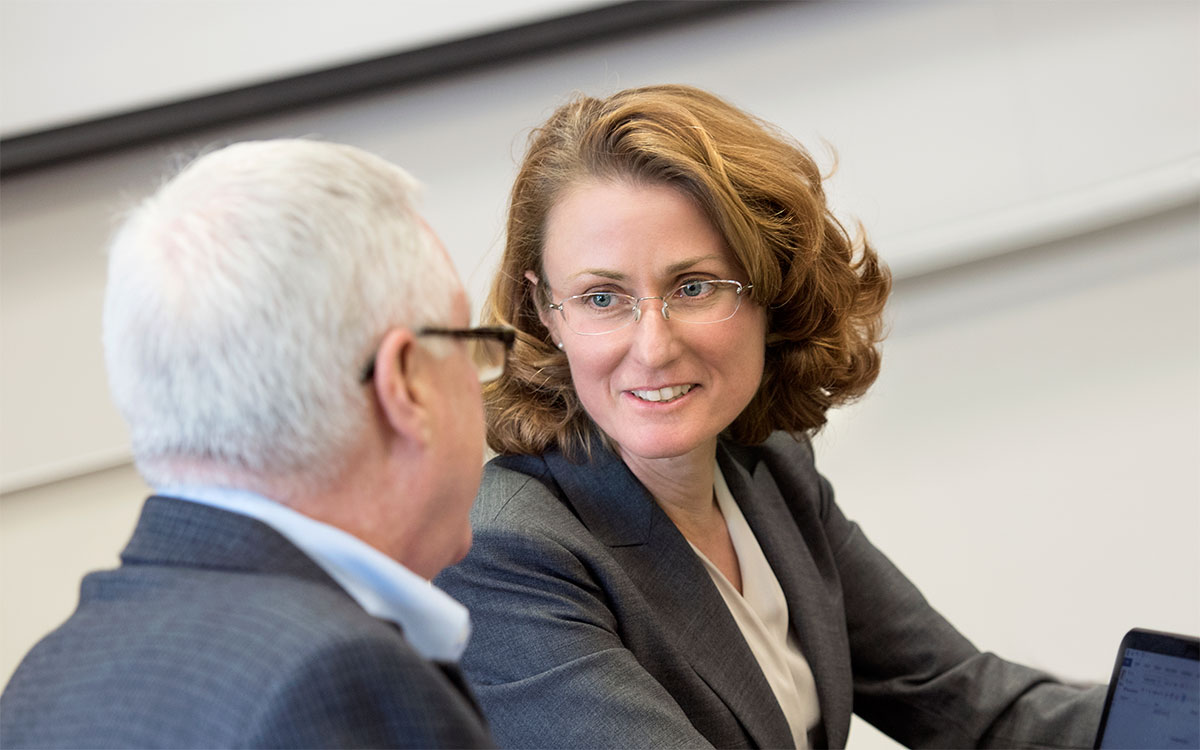
Theresa Mayer '88
I was an undergraduate in electrical engineering and mathematics when Virginia Tech first required students to use laptop computers. I remember lugging my computer all over campus—this was the late 1980s, years before most universities embraced this technology—and laptops then were not nearly as light and portable as they are today.
The memory comes to mind now that I have returned to Virginia Tech as the vice president for research and innovation.
In those early days of personal computing, thought leaders at Virginia Tech recognized how human-computer interactions enriched the arts and sciences, and they made sure that students had those tools and knew how to use them.
That experience is a reminder of how natural it is for Virginia Tech to be on the leading edge of education and research. It's expected. We have always been a university of action; we create and share useful knowledge; and we tackle society's greatest challenges with the conviction of our motto, Ut Prosim (That I May Serve).
Today, as we compete in a world that has never before been so highly connected and complex, Virginia Tech is rebooting the land-grant model to serve a world in fast motion. It is thrilling to be part of that effort.
Having spent my career at land-grant institutions, I saw opportunity at Virginia Tech. First, I thought of how land-grant missions must focus on urban challenges, as well as challenges typically addressed through agricultural and mechanical arts.
Unlike many of our peers, we are well positioned to make national and global impact because of our presence in the National Capital Region. We increasingly provide opportunities for students to learn and equip them to meet the information and technology needs of employers, and we offer living labs in an urban region with global reach. Considering our dual centers of influence—in Northern Virginia in addition to the innovation and economic efforts in the New River Valley—Tech truly has a dynamic reach.
The timing could not be better. Virginia Tech is on a unique upward trajectory. Because of the compelling Beyond Boundaries vision of the university's leadership and because of the legacy of strategic research investments over the past 15 years, we are poised to make tremendous strides. In addition, student enrollment and faculty hires are on the rise.
Beyond that, Virginia Tech is a lot like I remembered it. Hokie Stone is everywhere, and Skipper still fires during special occasions. And if you see me on my way to a brainstorming session, chances are I will have a laptop with me. Some things don't change.
